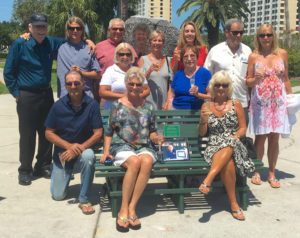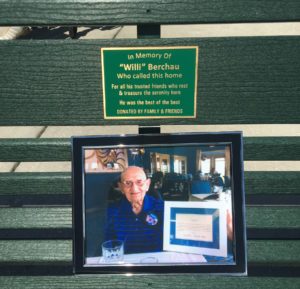William Berchau
State of Florida
William Berchau was born in Lituania in 1914.
He fled to Germany during Joseph Stalin’s rise to power, then immigrated from Germany to the United States to escape Adolph Hitler’s regime.
Berchau had a long career as an employee of the Illinois Central Railroad.
He and his wife retired in Clearwater, Fla.
Shortly after her death in 2010, he attempted to sell his house and was soon taken into the Florida Guardian Program.
Patricia Johnson was appointed his professional guardian late that year. He has tried to have her removed on several occasions, to no avail.*
Note: ABC Action News I-Team has done several reports on Mr. Berchau’s guardianship beginning with:
|
Elderly Pinellas Man Freed From Alzheimer’s Unit After I-Team Looks at His Case On a Sunday morning last month, a spry 99-year-old Pinellas County retiree got his first taste of freedom in weeks. William Berchau says he doesn’t get out of an assisted living facility much anymore. “No, I’m not allowed,” Berchau told the ABC Action News I-Team. “My court-appointed guardian doesn’t allow me to leave the premises.” In Florida, judges appoint guardians for people deemed no longer able to handle their own affairs. About 3,500 wards in Pinellas have such guardians. A month before his Sunday visit to church in August, Berchau was placed in a locked Alzheimer’s unit at the Grand Villa of Pinellas Park. Berchau and his pastor contend Florida’s guardianship system has let him down and their complaints about his guardian have been ignored by the Pinellas judiciary. “He seems to be very mentally sharp and alert,” Berchau’s pastor, David Priebe, said of his church member. “I just can’t believe that somebody would think he’s incompetent mentally.” The I-Team pointed out to the clergyman that the Pinellas probate court has ruled Berchau to be incapacitated three times since 2010. Priebe just shook his head. “Wow,” the pastor said. Berchau, who speaks with an accent, escaped Stalinist Russia, then Hitler’s Germany. But he is spending his last years in his adopted country with little control over his life. His friends have been allowed to take Berchau out of the locked unit so he could worship at Priebe’s church. Otherwise, Berchau said: “You see nobody. You have no contact with anybody.” Three years ago, professional guardian Patricia F. Johnson was appointed to oversee Berchau’s affairs after a state social worker learned that he tried to sell his house for a below-market price of $55,000. Johnson, 67, took control of more than $500,000 of Berchau’s assets. Those assets included his home, which Johnson sold for $65,000.That sale was for $26,400 less than the Pinellas property appraiser’s valuation of $91,400. As guardian, Johnson, who is also a Pinellas Park city councilwoman, was permitted to change Berchau’s doctor and sell his possessions. Johnson, who looks after more than 50 Pinellas wards, also confiscated Berchau’s voting and identification cards, closed his bank account, and had his mail sent to her home. “If I get packages,” Berchau told the I-Team, “it’s opened up to take a look what’s in it.” State law allows a guardian to bill wards $70 an hour for the time it takes to perform tasks such as visiting them, opening their mail and taking them to appointments. Berchau says he has asked to see an accounting of how his guardian spends his money, but has been denied. In Pinellas, the probate court has a standing order that seals every guardian’s annual accounting files. “There’s nobody that’s more vulnerable than a ward who has assets and can’t keep track of where they’re going or what’s happening with them,” said Robert W. Melton, who retired in 2009 as inspector general for the Pinellas circuit court clerk. “The ward basically has no rights.” During his nine years as the Pinellas clerk’s internal watchdog, Melton was a critic of the county guardianship system’s lack of transparency. “It’s a very closed process and, in many cases, the public is not aware of the things that have gone on or are going on in guardianships,” Melton said. Pinellas Circuit Judge Jack St. Arnold, who presides over the Berchau guardianship and hundreds of others, says he doesn’t believe the secrecy surrounding guardianships is a problem. “I think our professional guardians do a wonderful job,” St. Arnold told the I-Team. “I’m really pleased with them.” The judge was a featured speaker at a recent conference of the county’s professional guardians. Johnson, too, was in attendance. But she declined to answer questions from the I-Team. “I took an oath 27 years ago that I would not discuss my patients, my clients,” Johnson said. Until July, Berchau lived at the Inn at the Fountains, an ALF in St. Petersburg. Without advance warning to Berchau, Johnson moved him to the locked Alzheimer’s unit at the Grand Villa, which state regulators have fined twice since 2005. The Inn at the Fountains hasn’t been fined in recent years, according to state records. “In our opinion, Mr. Berchau was not a candidate for a secured unit when he left the Fountains,” that ALF’s executive director wrote in an email to the I-Team last month. After the I-Team began examining Berchau’s situation, Johnson — again with no explanation to her ward — moved him out of the Grand Villa’s locked unit to a less restrictive wing of the ALF. Last year, Berchau’s relatives in Germany hired a Brandon attorney to try to have Johnson removed as guardian. But the judge ruled against Berchau, who ended up having to pay the legal bills of Johnson’s lawyer to fight him in court. “There’s a lot of things wrong,” Berchau told the I-Team. “It’s got to be looked into.” |
Visit NASGA’s blog for ongoing coverage by the ABC Action News I-Team! Thank you reporters Adam Walser and Francis Gilpin!
| Willi Berchau left this earth on May 20, 2015. Following is a short tribute to Willi from his buddy, Adam Walser:
“A sad day for us, as one of our heroes has passed…Willi Berchau… who fought for the rights of wards in predatory guardianships… died peacefully this morning. He was wrongly placed in an Alzheimer’s unit, told his story to the world and eventually was freed by the court system. His final year and a half, he spent surrounded by friends and supporters and more importantly… free! The I-Team went to his 101st birthday party just last month. Willi was a sweet, kind soul who had courage to stand up against what was wrong. Isolated from the world, he found a way to speak out and people listened…. eventually passing laws cracking down on predatory guardianships. I remember Willi with his fist pumped in the air, showing his belief that he achieved victory over oppression. Some of us have heroes who are movie stars or professional athletes or corporate moguls. Mine was a small German man, who always had a smile on his face and who spoke softly with a thick accent. What he had to say will long be remembered.” |
Publisher’s Note: The story of Willie Berchau and his ordeal as a ward of a professional guardian is sad, complicated and just one example of how the elderly can be abused. Thank goodness for the people who fought to help him. This is an updated version of the printed story.
 A green bench, reminiscent of those that lined the streets of St. Petersburg for 50 years in the 20th century, was dedicated to “Willie” Berchau at the Fountains in S. Pasadena in early July.
A green bench, reminiscent of those that lined the streets of St. Petersburg for 50 years in the 20th century, was dedicated to “Willie” Berchau at the Fountains in S. Pasadena in early July.
It was a synergistic event whose participants included a volunteer for a program that advocates for the elderly, a former mayor with a passion for green benches, a local wood craftsman, a reverend, and a number of caring friends who loved Willie.
The story began in 2011 when Jane Barr, a volunteer Florida Long Term Care Ombudsman was assigned to Willie,97 at the time, after he became a court-appointed ward of a professional guardian. Jane visited him at the Fountains where he lived and was puzzled.
“I can’t figure out why this man at 97 years old even had a guardian because he does everything for himself, he knows everything, he speaks four languages,” she recalls.
Willie was a Lutheran so Jane introduced him to her friends Heather and Jimmie Riley so they could all go to church together. Willie and Jimmie both had railroad careers and the they all hit if off. They and other acquain- tances visited Willie often and even hosted a 99th birthday party for him at their home in 2013.
Later that year his guardian had him placed in an Alzheimer facility despite evidence that it wasn’t warranted.
Jane, Heather and Jimmie were horrified. Willie’s pastor recalls visiting and said it was pathetic to see him there. They wrote countless unanswered letters to the judge and even the governor, then finally enlisted the help of State Senator Jeff Brandes who heard Willie’s story, visited him immediately and got a lawyer to help.
They also told their story to ABC Action News and after a piece aired about his plight, he was moved to a less restrictive area and after six months in the facility he was allowed to move back to the Fountains.
Meanwhile Fountains’ resident and former S. Pasadena Mayor Dick Holmes, had been working on a book about green benches and read a news article about a local craftsman Flash Williamson who was making them. Holmes called, they talked, became friends and Holmes started buying the iconic benches for the Fountains complex. …
 Fast forward to 2017 and Holmes is having plaques made for the benches to commemorate the 100th anniversary of their introduction to the city in 1917 –Jane, Heather, Jimmie and Willie’s family bought a bench and arranged to have it dedicated to Willie–and that is how a group of previously unassociated people ended up toasting to Willie and his bench by the pond in front of the Fountains. Willie passed away at 101 in 2015.
Fast forward to 2017 and Holmes is having plaques made for the benches to commemorate the 100th anniversary of their introduction to the city in 1917 –Jane, Heather, Jimmie and Willie’s family bought a bench and arranged to have it dedicated to Willie–and that is how a group of previously unassociated people ended up toasting to Willie and his bench by the pond in front of the Fountains. Willie passed away at 101 in 2015.

 Jim Heath – TX
Jim Heath – TX